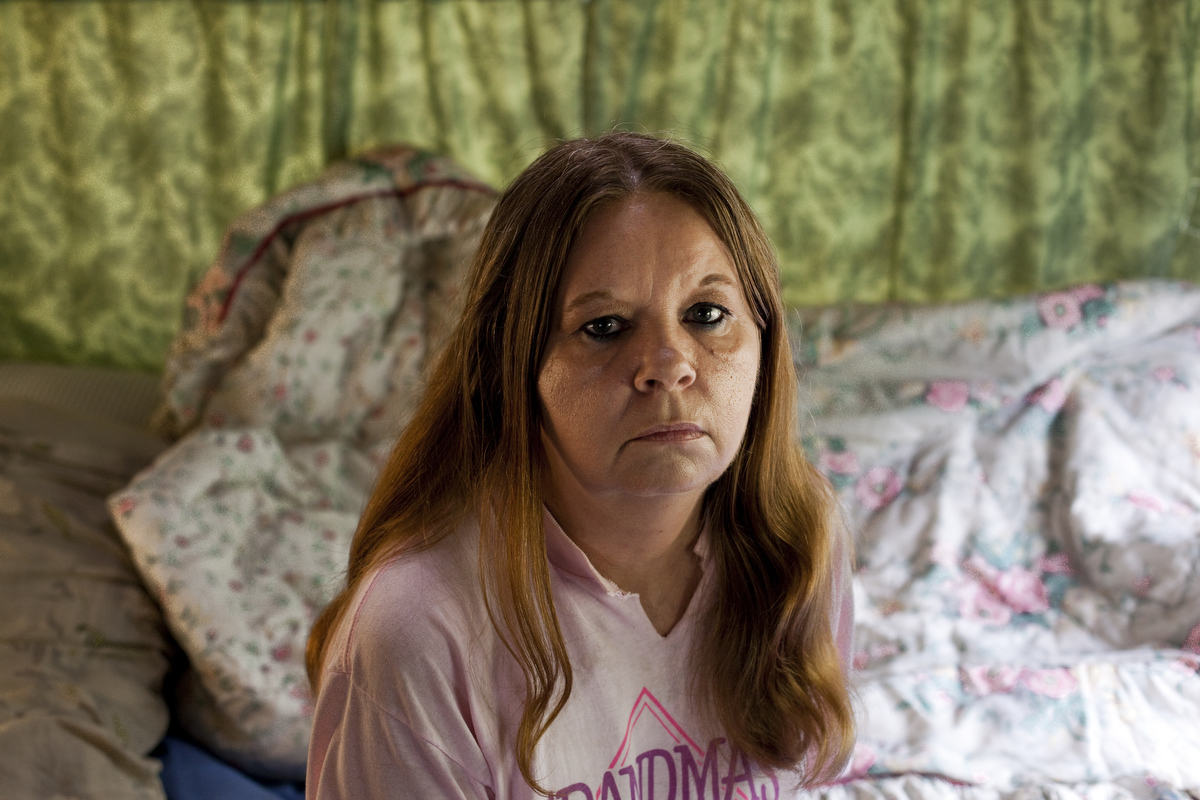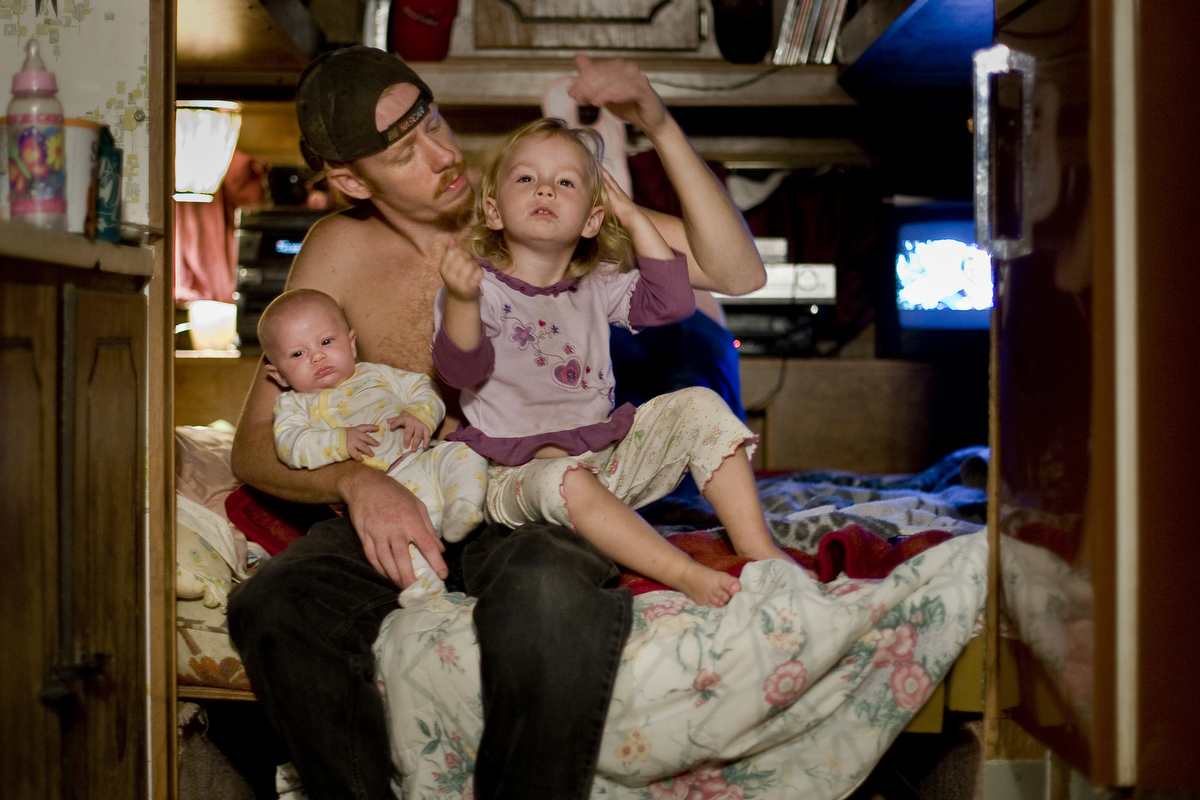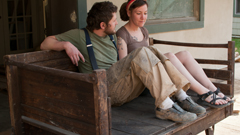Previous | 1 | 2 | 3 | 4 | Next
Adrift
A story about drugs, family and absence along a bend in the river
TranscriptVIDEO : Mother and Son
Shelia Simmons leans against two wrinkled pillows inside her camper, holding loose pages of densely filled paper between her glossy painted fingertips. A worn notebook sits in front of her. It is filled with similar sheets, letters from her son in prison.
Her eyes fixate on the letter as she slowly flips through the pages. She opens the small red curtain and stares through the window, out over the slow roll of the Ohio River.
"The water is finally starting to go down," she says as she exhales blue smoke against the thin glass. The water is a deep brown, more sediment than liquid, as it absorbs the spring sunshine. She watches as an American Electric Power towboat churns up a wake. The swollen half-mile-wide river rumbles as the towboat steadily pushes 12 identical barges upriver. Each barge sinks deep into the dark current under the weight of the coal piled above its rails.
The squelch of a police scanner on the bolted-down dining room table breaks the quiet and brings her attention back from the river.

During Travis's incarcerations, Shelia helps support her family and granddaughters. "You‘re a good daddy," she told him, "but you cannot be the best daddy you can on drugs."
"People just don't know how to deal when the water comes up," she says. She heard from friends that two days ago, a man drowned trying to drive through the high water.
Brushing her long, lustrous hair from her eyes, she sets down her son's letter and begins to write. She documents what has come over the scanner, what she has heard from friends: "his body floated out… found him up against a tree." She is writing him back, a correspondence with little longing or sentiment. The writings serve as Shelia's weekly update to her son. News from home: stories about sick friends and family members, about jobs, money and gas prices, stories about his children, and about the work that is being done on his camper to prepare it for when he returns.
She has waited all day. Reaching up into the cupboard above her head she removes a box of bargain tea bags. Grabbing eight of the pouches, she drops them into a half-gallon pitcher of water. Shelia sets the small microwave above the broken stove to high, brewing the tea. The phone rings to life, bouncing off the walls of the tiny camper. She picks it up, but does not say hello. She pushes buttons, following the cues of the answering system on the other end of the line.
"What took you so long?" she says into the receiver as she walks the three steps to the camper's side door.
"Patience," she yells, her neck stretched into the warm spring air outside. "Daddy wants to talk to you. Hurry."
This is a story about drugs, family and absence along a bend in the river. Travis Simmons is attempting to move past his addiction, and despite prison, parole, parents, and his devotion to his daughters, he cannot stay out of trouble. Now his mother, Shelia, helps care for his daughters, Patience and Journey, and worries for their future, wondering when her son will come home, and if he will screw up again.

Travis holds his daughters, Journey and Patience, on the first night of his release from jail into home confinement. When Travis began his home confinement sentence Journey was three months old and Patience three years old.
Later, driving the winding road along the river, the girls are asleep in back. Shelia is picking them up from her daughter's trailer where they played with their cousins.
"Why's my family gotta be full of drug addicts?" she says. Shelia's white sedan rattles over a set of railroad tracks and, which scrapes the oil pan. She pulls off of West Virginia Route 2 and up to her camper. Shelia's son, daughter, and nephew have all been addicted to drugs and served time for crimes surrounding their use. She has grown tired of court appearances. She found out that her nephew was arrested for burning the rubber coating off electric wires to sell the copper. Recently she attended the funeral of one of Travis' friends. He was shot in the head by a buddy who was high on pills. "It is in their blood," she says.
Why's my family gotta be full of drug addicts? — Shelia Simmons
It's not just her family. Travis and Shelia are among the thousands of West Virginians affected by a prescription drug abuse epidemic strangling Appalachian areas like Jackson County. According to the Centers for Disease Control and Prevention, between 1999 and 2004, West Virginia had a 550 percent increase in fatal drug overdoses, the largest in the nation. In 2006, drug overdoses were the leading cause of death in West Virginia for adults under the age of 45.




